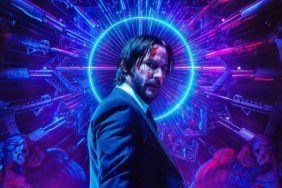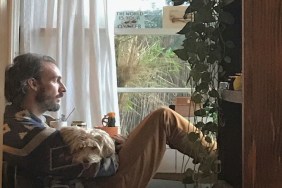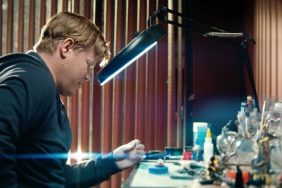We interviewed Edgar Ramirez back in June for two reasons. One was that his film The Liberator played at the Los Angeles Film Festival. The other is that Ramirez was leaving to shoot Point Break so wouldn’t be available at all the rest of the summer. The Liberator opens this weekend and Ramirez plays South American leader Simon Bolivar, who liberated South America from Spanish rule. In Point Break he’ll play Bodhi, the leader of a gang of extreme sports criminals.
Related: Watch Edgar Ramirez Perform an Exorcism for CraveOnline
CraveOnline: Was Simon Bolivar a character you’d always wanted to play all your life?
Edgar Ramirez: It’s a character that has always fascinated me for many reasons. Not only as an actor but as a human being. Of course, as I became an actor, it crossed my mind. But it was a character so larger than life that it never occurred to me that a movie of this scale was ever going to be made and that someone would take the risk of making it. Let’s say that I was very happy and of course excited when Alberto Arvelo came to me to offer the character to me.
Bolivar’s legacy is part of our collective imagery in Latin America, especially in Venezuela. There are portraits of Bolivar, paintings of Bolivar in every governmental office, in every school. There’s a square in every village and every town that bears the name of Bolivar. Avenues, philharmonics, airports, schools. universities. So it was pretty much in our collective imagery, but normally in a unidimensional way, which is normally what happens with historic figures. Then what we try to do in the movie, what I found very appealing about the project, was the contradiction and the layers that the director wanted to explore, and which were so keenly and wonderfully reflected in the script.
Some of my favorite shots are when Arvelo has the camera overhead during the big battles. When you filmed those battle scenes, were you aware of the camera circling overhead?
No. I probably saw them before they called action but when you’re trying to push for real against all these guys, we were really pushing for real. We didn’t pretend anything. It was really happening. We were a bunch of people, men and women, trying to push against each other so your focus had to be in trying to break through.
Was the “Sons of America” speech on the bridge of the river an important moment for you?
It was really important. It was really intense because it happened on a real location. All those extras were real so our voices needed to really reach out to all those guys. The emotional reaction of the troop was very intense. That was one of those moments where reality meets fantasy and the two planes intertwine in a way, where people forget that they’re making a movie. It was really intense. There were people behind the camera who also got very excited. They clapped, they applauded after the speeches. It was really intense.
You look into the camera for the last few lines of that speech. Did you do that in every take?
I don’t remember.
Was that your idea or Arvelo’s?
I think it happened. It just happened. Actually, I remember Alberto telling me to be mindful of the character, probably not to look into the camera, but he ended up choosing that frame.
What did it mean to you to be executive producing The Liberator also?
The opportunity to help the movie, the opportunity to help such a difficult movie to get made. To help it be put together because it was a very risky project. It was a very difficult movie to put together, as any other movie, but especially this one. A movie about a historic figure for Latin America, shot 70% in Spanish on such a big scale. There was a lot of risks involved.
Did you get to shoot at all in chronological order or anything close?
Portions, sections of the movie. Actually, the first shot of the movie, the first thing we shot was a canoe shot where we were on the river. That was the first thing that we shot.
So when Bolivar was battle weary, were you weary from all the production?
Yeah, that was very easy. That was very easy for everyone. We didn’t have to perform it or play much. We were ready, we were out.
Did you feel like you got a few Braveheart moments in The Liberator?
I think that Braveheart got a few Liberator moments. Not to sound like an asshole, but we never intended this movie to be a Latin-American something something. This movie has a very unique aspect. For example, the landscape. The landscape is another character in this movie because Bolivar was very conscious of the importance of space. He had a very high sense of space and that’s why the landscape has a very fundamental role in the movie, as much as the music has because of the synchronism of Latin-American culture because we are a very intense mixture of the black culture coming from the slaves brought into the continent, the Amerindians who were here before the Spaniards came and of course the white European blood that came with the conquistadors. So we are a mixture and a result of all of that.
That translates I think very well into the music and the characters that you see in the movie. And also Braveheart is a very specific story that is circumscribed to the reality of a very specific moment of Scottish history. Bolivar, The Liberator, deals with not only one specific moment in Venezuelan/Columbian/Ecuadorian independence but it is broad. It is open to reflect the destiny of an entire continent. Bolivar didn’t only want freedom for the continent. He wanted the continent to be united in order to get stronger.
How cold was it on the Andes when you shot?
Very cold.
Did you get a temperature reading?
Just for our psychological sake we didn’t pay attention too much to the numbers.
Are you happy that Gerard Butler had a conflict so you can play Bodhi in Point Break?
Well, I’m happy that I’m playing Bodhi. I cannot be happy for an actor to drop out of the project for whatever reason. That doesn’t make me happy. It makes me happy that once that was available, they came to me to portray such an iconic character that I’ve always wanted to portray. For me, it is really, really an amazing thing that has happened. It was always a huge fantasy of mine to portray Bodhi. I’ve always wanted to play this character so it is almost magic because it’s not opportunistic of anything.
Actually, Point Break was the only remake that I always wanted to do but it was almost a very far off fantasy because Bodhi is such a Californian character and so California rooted, I never thought that something like that would come to me. Then I remember joking, goofing around with my friends saying, “You know, if there’s ever a remake of Point Break I want to play Bodhi and I would go for it. I didn’t even know that a remake was being made because I was completely immersed in Hands of Stone so I disconnected myself from the entire outside world. Suddenly, when they came to me with that offer, I was super, super happy. That is one of the most influential movies to me.
I remember when I sat down for the first time with Kathryn Bigelow to discuss Zero Dark Thirty, I told her, “I love you and I love your movies. Point Break is one of my favorite movies. I love that movie and know it by heart. I’m a true fan of your work, all the way from Point Break, Blue Steel, Strange Days, not only from The Hurt Locker and on.” I go way back with my admiration for Kathryn. I remember I went on and on and on talking about Point Break and then suddenly I’m doing it. I remember when I got the offer I called up Kathryn and said, “Kathryn, I’ve been offered Bodhi in Point Break. What do you think? Do I have your blessing?” “Of course you have it, go!” She was really, really happy. Her response was very strong and I said, well, if the godmother says yes, if I’ve got her blessing… I’m very happy. I can’t believe it. It’s really an act of magic.
Will you bring a Latin touch to Bodhi?
Yeah, I think so inevitably. It’s a very international movie. What we are keeping from the first movie is the rebellious, subversive, anti-system spirit but it’s a total different story. You have an infiltration and you have Utah and you have Bodhi, but the rest takes on a totally different world but keeping the essence of the first one. So we are re-imagining the story but it’s not the same thing. We’re making another movie, keeping that essence.
But are you going to surf and skydive and whatever else they have in store?
Yeah, as much I can, yeah.
Fred Topel is a staff writer at CraveOnline and the man behind Best Episode Ever and The Shelf Space Awards. Follow him on Twitter at @FredTopel.









